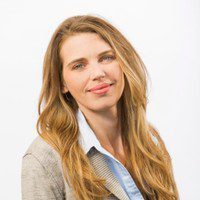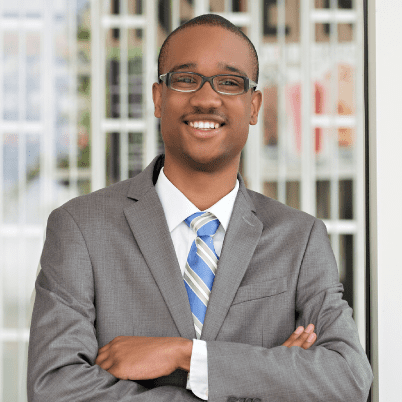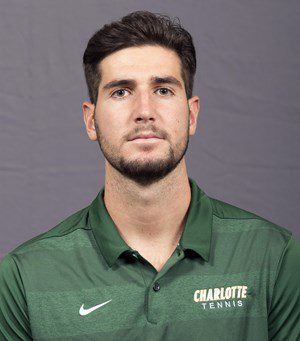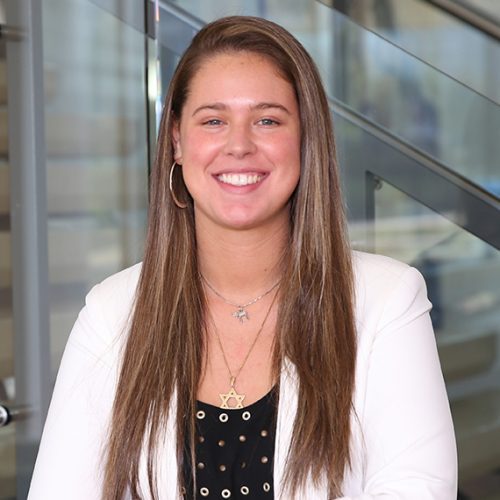M.S. in Economics: Celebrating 30 Years

Shanyn Viars found her dream job in a nontraditional field.
After earning her Master of Science in Economics from UNC Charlotte’s Belk College of Business, Viars was hired as an economic and policy research associate and the only economist on staff at American Rivers, a conservation organization based in Grand Rapids, Michigan.
“I wanted to use my degree to change public policy and, particularly, clean water – it is the backbone of a healthy community and society,” says Viars ‘15, ‘16. “As an economist, I help communities weigh sustainable options and foster innovative financing structures that will be needed to address our urgent water challenges.”

Viars (right) is one of a growing number of Belk College M.S. in Economics graduates who are pursuing a non-traditional economics career.
Economics Professor Craig Depken says graduates of the STEM-designated program are finding jobs in a wide variety of occupations and industries.
“Our curriculum provides students with the tools for economic analysis which can be applied in a wide range of areas, including economic development, education, medicine, logistics, sports, and politics, to name a few,” Depken says.
After earning her bachelor’s in economics, Viars found a job but was quickly disillusioned with cubicle life.
“I found out quickly that to do something impactful, I needed a master’s degree,” Viars says. Viars had good relationships with her professors, which played a major role in her decision to stay at the Belk College.
“Professor Depken helped me create my own academic path and choose courses that were purposeful,” Viars says.
It took a year to find her dream job, but Viars admits to being picky.
“I wanted a green or blue job, and they are harder to find,” Viars explains. “I used creativity in job search engines to look for roles requiring forecasting and analytic skills but not necessarily a job with ‘economic forecasting’ in the title. It is a shout-out to my professors who taught us to network, build our resume and be visible.”
Applied Learning
Sofia Nussbaum ‘18, ‘21 MBA, ‘21 M.S. in Economics, moved to Charlotte from Chile to pursue medical school.
However, working with her father in his restaurant, she discovered medicine wasn’t her passion. Instead, she felt an urge toward entrepreneurship, which led her to pursue a bachelor’s degree in economics. Today, Nussbaum is the owner of Crunch Bistro, a restaurant in Uptown Charlotte.
In May, she will earn her master’s in economics and her MBA from the Belk College.
When anyone asks how she manages a course load for two degrees while owning a business, the answer is simple: “I make time – there are no excuses.”
“I love public policy, and that is how you can make change with economics. I thought the program would help my entrepreneurial side,” Nussbaum says. “And, economics has a human element to it – it is not just data and information. This degree also helps me day-to-day at the restaurant where I make broad management decisions and can apply what I am learning in the program.”
Like Viars, Nussbaum credits her success in school and career to the engaged faculty.
“In Chile, professors are not invested in a student’s success like they are at UNC Charlotte,” Nussbaum says. “They make me want to do my best and professors like Carol Stivender inspires everyone. I do not want to let them down.”
Supporting Charlotte Business
John Connaughton, longtime professor of economics, stays in touch with many of his former graduate student researchers who have found jobs working in education, banking and other industries.
“At the end of the day, our program does two things – attract exceptional students and place them in jobs,” Connaughton says. “The role of faculty to guide and direct students during their coursework can’t be underestimated. We provide the skilled professionals who add value to the business strategies and economic direction, particularly for the Queen City.”
Connaughton says the role of faculty is two-fold – as instructors and mentors.
“Additionally, we work with graduate students, mentoring them through research projects, and this experience teaches them to ask questions and get applied experience,” he says.
Students are required to complete either two semesters of research activity or a supervised thesis program. This gives the students an end-result. Papers from many students have even been published in economic journals, Connaughton says.
![]()
30th Anniversary
Thirty years ago, as information technology was beginning to transform the field of economics, the M.S. in Economics program launched.
The program was conceived by Young Davis, chair of the Department of Economics at the time, recalls Ted Amato, professor of economics and the first program director.
“Young’s perception was that the Charlotte metropolitan area was ready for a master’s program in economics, both from the standpoint of opportunity for good placements as well as the pool of qualified potential students,” Amato says.
Belk College Dean Richard Neel was supportive of the initiative and took Amato to meet with dozens of business leaders to generate interest in the program.
“Meeting one-on-one with so many business leaders with Dean Neel was a huge investment in the program’s success,” Amato says. “We got some interest from the business community and enrolled some part-time students during those early years.”
At the beginning, two required courses that were created in response to increased computing technology – econometrics and economic forecasting – set the program apart.
Amato says the graduate program grew again in 2007 with the transition of courses to the evenings, helping to better accommodate working professionals.
UNC Charlotte’s location in the second-largest banking center in the nation has helped to pave the way to success for many graduates. Over the years, graduates have found careers in banking, forecasting, auditing, financial analytics, law, and other traditional sectors. Others headed for careers in academia.
The 30th anniversary of the M.S. in Economics is one of several milestones as the Belk College celebrates its 50th anniversary this academic year.
Learn More About the M.S. in Economics
What Alumni Are Saying
 “Professors who are also executives in real world industries and peers have an interest in everyone succeeding. We all look better when we are in it together.”
“Professors who are also executives in real world industries and peers have an interest in everyone succeeding. We all look better when we are in it together.”
– Kedric Wright ‘16, ‘17 M.S. in Economics, Analytic Consultant, Wells Fargo Advisors
 “I researched and gathered data that allowed Professor (John) Connaughton to compute the forecast for different macroeconomic variables such as employment or the different economic sectors for both North Carolina and the U.S. This was valuable to me as I got to use real-world data.”
“I researched and gathered data that allowed Professor (John) Connaughton to compute the forecast for different macroeconomic variables such as employment or the different economic sectors for both North Carolina and the U.S. This was valuable to me as I got to use real-world data.”
– Alejandro Garcia Moreno ‘20
 “Economics has a human element to it – it is not just data and information. This degree also helps me day-to-day at the restaurant where I make broad management decisions and can apply what I am learning in the program.”
“Economics has a human element to it – it is not just data and information. This degree also helps me day-to-day at the restaurant where I make broad management decisions and can apply what I am learning in the program.”
– Sofia Nussbaum ‘18, ‘21 MBA, ‘21 M.S. in Economics
Green and Gold Drive Business
The Belk College of Business at UNC Charlotte has been driving business for more than 50 years, with the M.S. in Economics program celebrating its 30th anniversary this year. Established in 1970, the college offers outstanding business education programs at the undergraduate, master’s, doctoral and executive levels. The Belk College is one of the Carolinas’ largest business schools, with more than 4,600 students, over 100 full-time faculty, and more than 33,000 alumni. Accredited by AACSB International, the college is committed to building strong partnerships in the greater Charlotte region and beyond as North Carolina’s urban research business school. Learn more about how the Belk College is driving business at belkcollege.charlotte.edu, and on LinkedIn, Facebook, Twitter and Instagram.